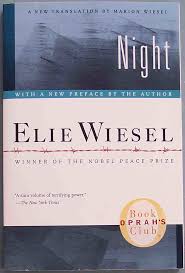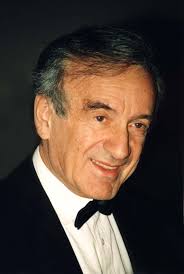Night Page #7
"Night" is a work by Elie Wiesel about his experience with his father in the Nazi German concentration camps at Auschwitz and Buchenwald in 1944–1945, at the height of the Holocaust toward the end of the Second World War. In just over 100 pages of sparse and fragmented narrative, Wiesel writes about the death of God and his own increasing disgust with humanity, reflected in the inversion of the parent–child relationship, as his father declines to a helpless state and Wiesel becomes his resentful teenage caregiver. "If only I could get rid of this dead weight ... Immediately I felt ashamed of myself, ashamed forever." In Night everything is inverted, every value destroyed. "Here there are no fathers, no brothers, no friends", a kapo tells him. "Everyone lives and dies for himself alone." Wiesel was 16 when Buchenwald was liberated by the United States Army in April 1945, too late for his father, who died after a beating while Wiesel lay silently
Tell him that I was a student? "Farmer," I heard myself saying. This conversation lasted no more than a few seconds. It seemed like an eternity. The baton pointed to the left. I took half a step forward. I first wanted to see where they would send my father. Were he to have gone to the right, I would have run after him. The baton, once more, moved to the left. A weight lifted from my heart. We did not know, as yet, which was the better side, right or left, which road led to prison and which to the crematoria. Still, I was happy, I was near my father. Our procession continued slowly to move forward. Another inmate came over to us: "Satisfied?" "Yes," someone answered. "Poor devils, you are heading for the crematorium." He seemed to be telling the truth. Not far from us, flames, huge flames, were rising from a ditch. Something was being burned there. A truck drew close and unloaded its hold: small children. Babies! Yes, I did see this, with my own e y e s ... c h i l - dren thrown into the flames. (Is it any wonder that ever since then, sleep tends to elude me?) So that was where we were going. A little farther on, there was another, larger pit for adults. I pinched myself: Was I still alive? Was I awake? How was it possible that men, women, and children were being burned and that the world kept silent? No. All this could not be real. A nightmare perhaps...Soon I would wake up with a start, my heart pounding, and find that I was back in the room of my childhood, with my books... My father's voice tore me from my daydreams: "What a shame, a shame that you did not go with your m o t h e r ... I saw many children your age go with their m o t h e r s ... " His voice was terribly sad. I understood that he did not wish to see what they would do to me. He did not wish to see his only son go up in flames. My forehead was covered with cold sweat. Still, I told him that I could not believe that human beings were being burned in our times; the world would never tolerate such crimes... "The world? The world is not interested in us. Today, everything is possible, even the crematoria...His voice broke. "Father," I said. "If that is true, then I don't want to wait. I'll run into the electrified barbed wire. That would be easier than a slow death in the flames." He didn't answer. He was weeping. His body was shaking. Everybody around us was weeping. Someone began to recite Kaddish, the prayer for the dead. I don't know whether, during the history of the Jewish people, men have ever before recited Kaddish for themselves. "Yisgadal, veyiskadash, shmey raba...May His name be celebrated and sanctified..." whispered my father. For the first time, I felt anger rising within me. Why should I sanctify His name? The Almighty, the eternal and terrible Master of the Universe, chose to be silent. What was there to thank Him for? We continued our march. We were coming closer and closer to the pit, from which an infernal heat was rising. Twenty more steps. If I was going to kill myself, this was the time. Our column had only some fifteen steps to go. I bit my lips so that my father would not hear my teeth chattering. Ten more steps. Eight. Seven. We were walking slowly, as one follows a hearse, our own funeral procession. Only four more steps. Three. There it was now, very close to us, the pit and its flames. I gathered all that remained of my strength in order to break rank and throw myself onto the barbed wire. Deep down, I was saying good-bye to my father, to the whole universe, and, against my will, I found myself whispering the words: "Yisgadal, veyiskadash, shmey raba...May His name be exalted and sanctified..." My heart was about to burst. There. I was face-to-face with the Angel of Death... No. Two steps from the pit, we were ordered to turn left and herded into barracks. I squeezed my father's hand. He said: "Do you remember Mrs. Schächter, in the train?" NEVER SHALL I FORGET that night, the first night in camp, that turned my life into one long night seven times sealed. Never shall I forget that smoke. Never shall I forget the small faces of the children whose bodies I saw transformed into smoke under a silent sky. Never shall I forget those flames that consumed my faith forever.Never shall I forget the nocturnal silence that deprived me for all eternity of the desire to live. Never shall I forget those moments that murdered my God and my soul and turned my dreams to ashes. Never shall I forget those things, even were I condemned to live as long as God Himself. Never. THE BARRACK we had been assigned to was very long. On the roof, a few bluish skylights. I thought: This is what the antechamber of hell must look like. So many crazed men, so much shouting, so much brutality.
Translation
Translate and read this book in other languages:
Select another language:
- - Select -
- 简体中文 (Chinese - Simplified)
- 繁體中文 (Chinese - Traditional)
- Español (Spanish)
- Esperanto (Esperanto)
- 日本語 (Japanese)
- Português (Portuguese)
- Deutsch (German)
- العربية (Arabic)
- Français (French)
- Русский (Russian)
- ಕನ್ನಡ (Kannada)
- 한국어 (Korean)
- עברית (Hebrew)
- Gaeilge (Irish)
- Українська (Ukrainian)
- اردو (Urdu)
- Magyar (Hungarian)
- मानक हिन्दी (Hindi)
- Indonesia (Indonesian)
- Italiano (Italian)
- தமிழ் (Tamil)
- Türkçe (Turkish)
- తెలుగు (Telugu)
- ภาษาไทย (Thai)
- Tiếng Việt (Vietnamese)
- Čeština (Czech)
- Polski (Polish)
- Bahasa Indonesia (Indonesian)
- Românește (Romanian)
- Nederlands (Dutch)
- Ελληνικά (Greek)
- Latinum (Latin)
- Svenska (Swedish)
- Dansk (Danish)
- Suomi (Finnish)
- فارسی (Persian)
- ייִדיש (Yiddish)
- հայերեն (Armenian)
- Norsk (Norwegian)
- English (English)
Citation
Use the citation below to add this book to your bibliography:
Style:MLAChicagoAPA
"Night Books." Literature.com. STANDS4 LLC, 2025. Web. 30 Jan. 2025. <https://www.literature.com/book/night_336>.








Discuss this Night book with the community:
Report Comment
We're doing our best to make sure our content is useful, accurate and safe.
If by any chance you spot an inappropriate comment while navigating through our website please use this form to let us know, and we'll take care of it shortly.
Attachment
You need to be logged in to favorite.
Log In